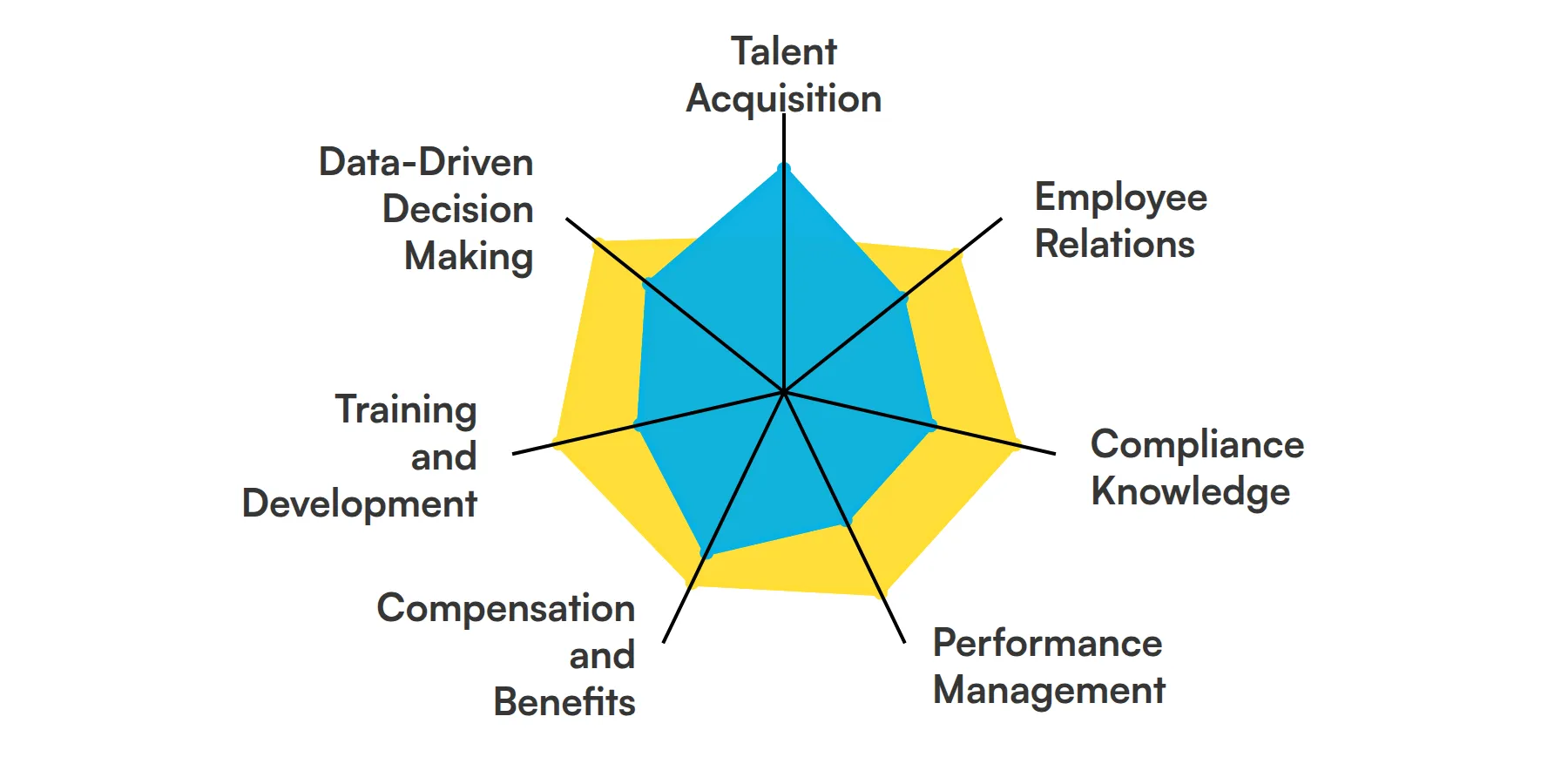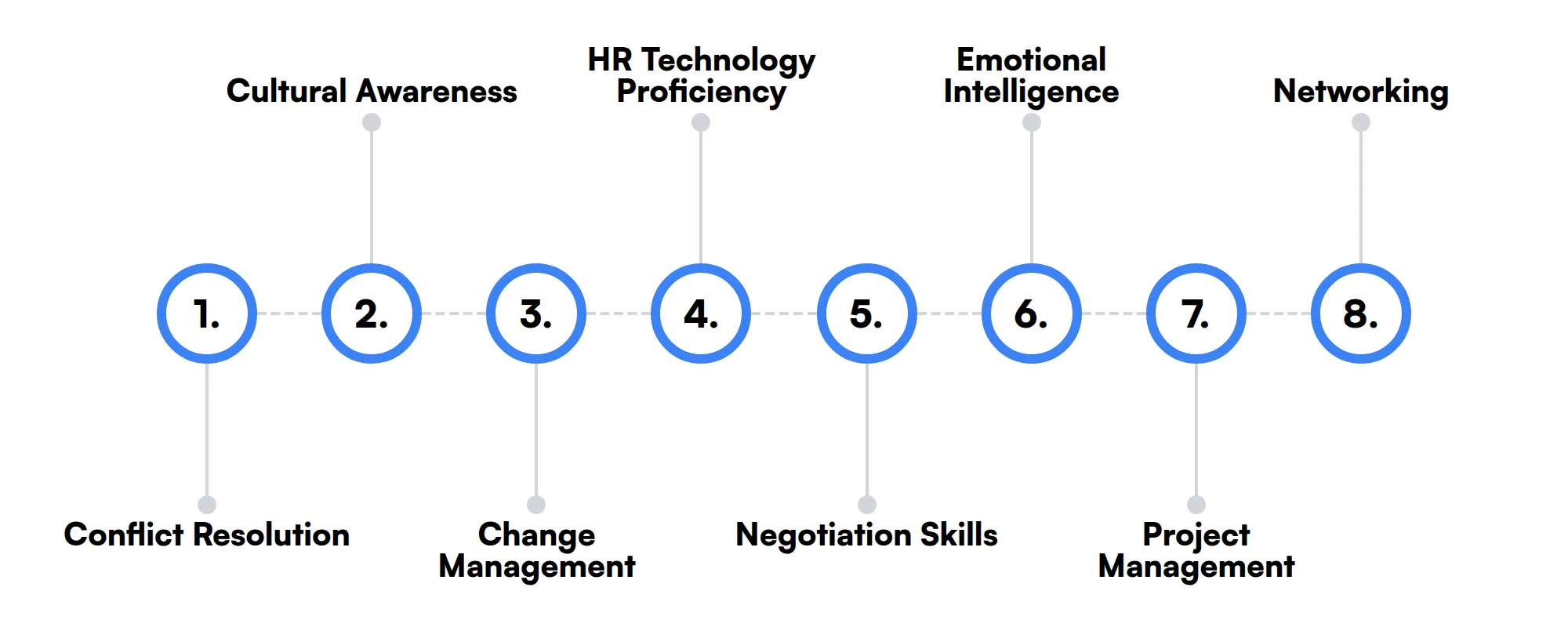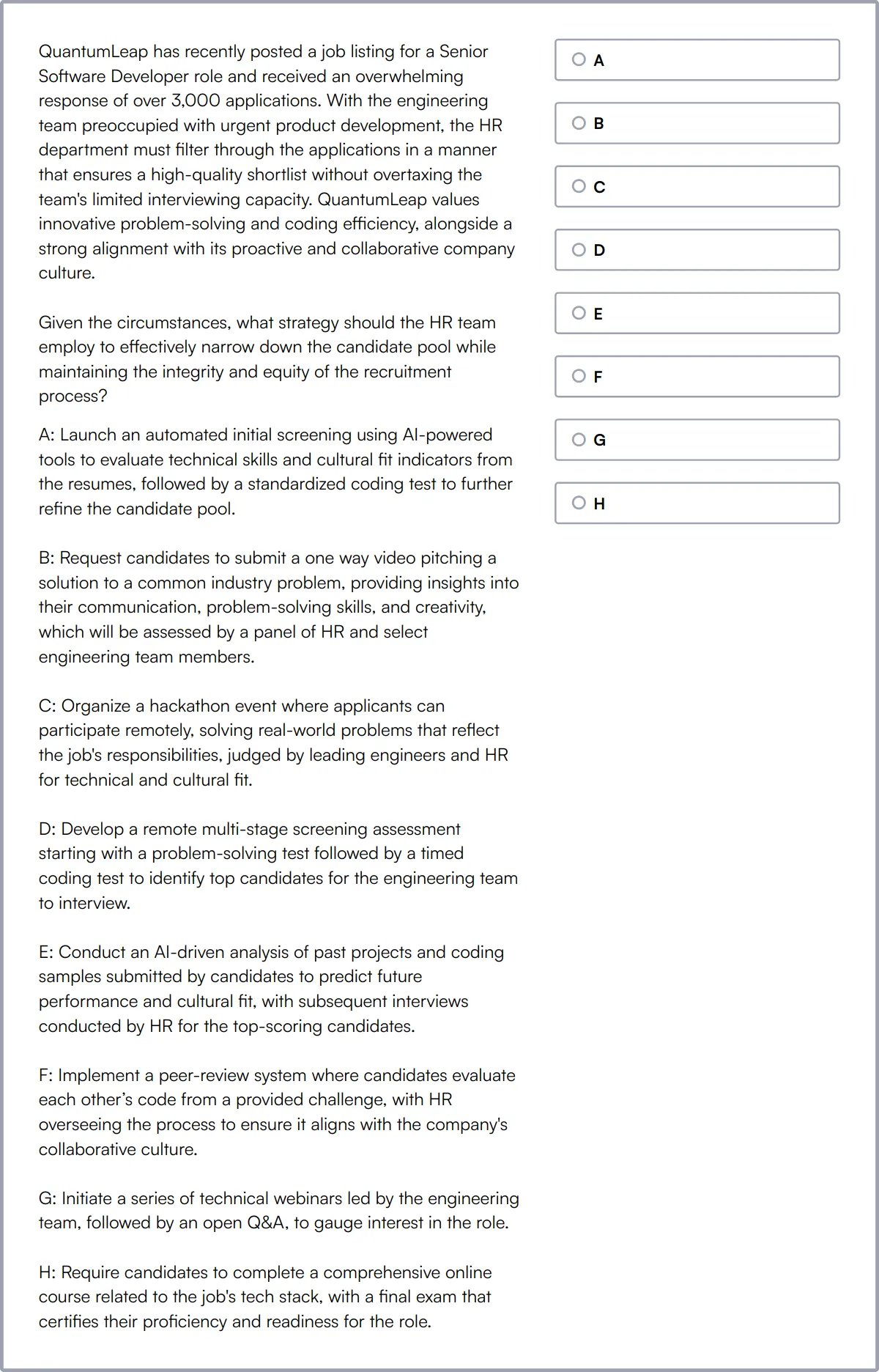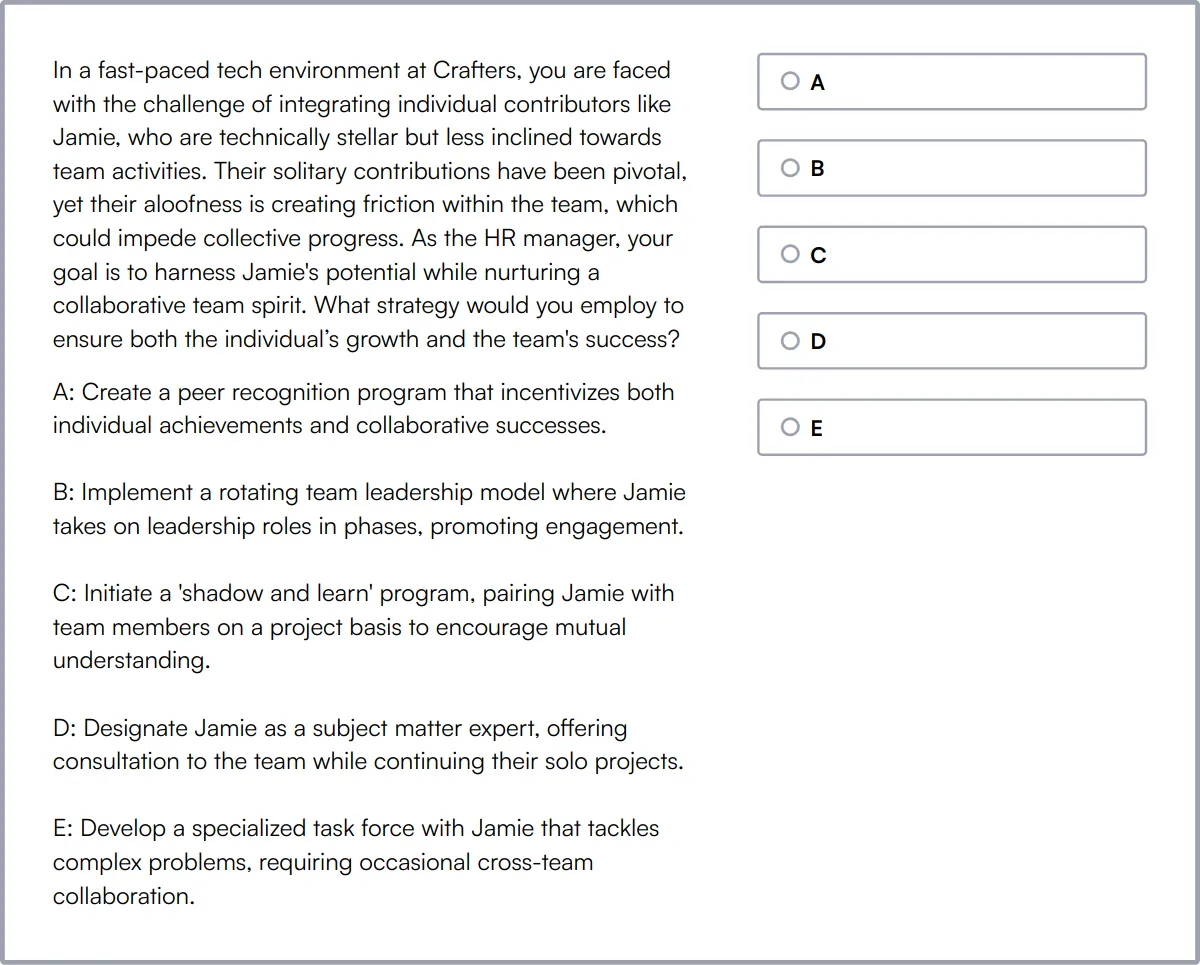HR managers are the backbone of any organization, ensuring that the workforce is motivated, skilled, and aligned with the company's goals. They play a key role in managing employee relations, recruitment, and compliance with labor laws.
Skills required for an HR manager include strong communication, conflict resolution, and organizational abilities, as well as a deep understanding of human resources practices and employment regulations.
Candidates can write these abilities in their resumes, but you can’t verify them without on-the-job HR Manager skill tests.
In this post, we will explore 7 essential HR Manager skills, 8 secondary skills and how to assess them so you can make informed hiring decisions.
Table of contents
7 fundamental HR Manager skills and traits
The best skills for HR Managers include Talent Acquisition, Employee Relations, Compliance Knowledge, Performance Management, Compensation and Benefits, Training and Development and Data-Driven Decision Making.
Let’s dive into the details by examining the 7 essential skills of a HR Manager.

Talent Acquisition
An HR manager needs to excel in talent acquisition to identify and attract the right candidates for the organization. This involves understanding the job requirements, sourcing candidates through various channels, and ensuring a smooth recruitment process. The ability to spot potential and match candidates to roles is crucial for building a strong team.
For more insights, check out our guide to writing a Talent Acquisition Specialist Job Description.
Employee Relations
Managing employee relations is key for an HR manager to maintain a harmonious workplace. This skill involves addressing employee concerns, mediating conflicts, and fostering a positive work environment. By effectively managing relationships, the HR manager helps to boost morale and productivity.
Compliance Knowledge
An HR manager must be well-versed in labor laws and regulations to ensure the organization remains compliant. This includes understanding employment laws, health and safety regulations, and industry-specific guidelines. Staying informed about legal changes helps prevent costly legal issues and protects the company.
Check out our guide for a comprehensive list of interview questions.
Performance Management
Performance management is about setting clear expectations, providing feedback, and evaluating employee performance. An HR manager uses this skill to help employees grow and align their goals with the organization's objectives. Effective performance management leads to improved productivity and employee satisfaction.
Compensation and Benefits
Designing and managing compensation and benefits packages is a critical skill for an HR manager. This involves ensuring competitive salaries, benefits, and incentives to attract and retain talent. A well-structured compensation plan can significantly impact employee motivation and retention.
For more insights, check out our guide to writing a HR Analyst Job Description.
Training and Development
An HR manager is responsible for identifying training needs and implementing development programs. This skill helps in enhancing employee skills and preparing them for future roles. By investing in training, the HR manager contributes to the organization's growth and adaptability.
Data-Driven Decision Making
Using data to inform HR decisions is increasingly important. An HR manager should be able to analyze HR metrics and trends to make informed decisions about hiring, retention, and employee engagement. Data-driven insights help in optimizing HR strategies and improving organizational outcomes.
Check out our guide for a comprehensive list of interview questions.
8 secondary HR Manager skills and traits
The best skills for HR Managers include Conflict Resolution, Cultural Awareness, Change Management, HR Technology Proficiency, Negotiation Skills, Emotional Intelligence, Project Management and Networking.
Let’s dive into the details by examining the 8 secondary skills of a HR Manager.

Conflict Resolution
The ability to resolve conflicts effectively is important for maintaining a peaceful work environment. An HR manager uses this skill to mediate disputes and find amicable solutions.
Cultural Awareness
Understanding and respecting diverse cultures within the workplace is essential for an HR manager. This skill helps in creating an inclusive environment where all employees feel valued.
Change Management
Guiding the organization through change is a valuable skill for an HR manager. This involves planning and implementing change initiatives while minimizing disruption to the workforce.
HR Technology Proficiency
Familiarity with HR software and tools is important for streamlining HR processes. An HR manager should be comfortable using technology to manage employee data and automate routine tasks.
Negotiation Skills
Negotiation skills are useful for an HR manager when discussing salaries, benefits, and resolving disputes. Effective negotiation can lead to mutually beneficial outcomes for the organization and employees.
Emotional Intelligence
Emotional intelligence helps an HR manager understand and manage their own emotions and those of others. This skill is crucial for building strong relationships and fostering a supportive work environment.
Project Management
Managing HR projects, such as implementing new policies or organizing training sessions, requires strong project management skills. An HR manager must be able to plan, execute, and oversee projects efficiently.
Networking
Building a professional network is beneficial for an HR manager to stay informed about industry trends and best practices. Networking can also aid in talent acquisition and professional development.
How to assess HR Manager skills and traits
Assessing the skills and traits of an HR Manager is more than just glancing at their resume. It involves understanding how well they can handle real-world challenges across various domains such as Talent Acquisition, Employee Relations, and Compliance Knowledge. It's about seeing them in action and evaluating their impact on the organization.
Traditional methods like interviews and reference checks can provide some insights, but they often fall short in measuring the actual competencies in Performance Management, Compensation and Benefits, and Training and Development. This is where skills assessments come into play, offering a more objective and comprehensive evaluation.
For instance, using Adaface assessments can transform how you gauge an HR Manager's capabilities. These assessments are designed to mirror real HR scenarios, helping you see how candidates handle tasks that they would face on the job. By integrating these tests, companies have seen a 2x improvement in the quality of hires and an 85% reduction in screening time, making the hiring process not only faster but also more reliable.
Let’s look at how to assess HR Manager skills with these 4 talent assessments.
Talent Acquisition Test
Our Talent Acquisition Test measures a candidate's proficiency in sourcing, recruiting, and onboarding qualified individuals. It also evaluates their ability to leverage recruitment technologies and data analysis to meet the organization's human capital needs.
The test assesses skills in logical reasoning, situational judgement, candidate screening, and interviewing. It challenges candidates to apply these skills in realistic recruitment scenarios to select the best candidates.
Successful candidates demonstrate strong capabilities in job analysis and creating effective job descriptions, which are critical for attracting the right talent.

HR Test
Our HR Test evaluates a candidate's ability to handle common workplace challenges in staffing, align employee behavior with business goals, and utilize HR software to support management and staff.
This test covers critical thinking, abstract reasoning, situational judgement, and conflict management. Candidates must navigate through scenarios that test their ability to manage talent pipelines and resolve conflicts.
High-scoring candidates will show adeptness in both theoretical HR management fundamentals and practical application in talent acquisition.

GDPR Online Test
Our GDPR Online Test uses scenario-based MCQs to evaluate candidates on their understanding of GDPR regulations and best practices for data protection and privacy.
The test assesses knowledge in data privacy, protection, security, and compliance. Candidates must identify and evaluate data protection risks and develop GDPR compliance policies.
Candidates proficient in consent management, data retention, and transfer policies will excel, ensuring the security and privacy of personal data.
Data Analysis Test
Our Data Analysis Test assesses a candidate's ability to handle, modify, analyze, and interpret data. It screens for experience with data tools and SQL, crucial for analyzing data to find outcomes, detect anomalies, and extract insights.
The test includes questions on data modeling, analysis, interpretation, and SQL queries. Candidates must demonstrate their ability to use data tools like Excel and SQL to manage and analyze data effectively.
Successful candidates will be proficient in using data to make predictions, identify correlations, and rank data, which are key for making informed business decisions.

Summary: The 7 key HR Manager skills and how to test for them
| HR Manager skill | How to assess them |
|---|---|
| 1. Talent Acquisition | Evaluate a candidate's ability to identify and attract top talent. |
| 2. Employee Relations | Assess how effectively a candidate manages and supports staff interactions. |
| 3. Compliance Knowledge | Test knowledge of legal regulations and company policy adherence. |
| 4. Performance Management | Review a candidate's approach to monitoring and enhancing staff performance. |
| 5. Compensation and Benefits | Check understanding of fair and competitive employee compensation packages. |
| 6. Training and Development | Observe strategies for employee skill enhancement and career growth. |
| 7. Data-Driven Decision Making | Analyze ability to use data for informed business decisions. |
HR Test
HR Manager skills FAQs
How can recruiters assess talent acquisition skills in HR Manager candidates?
Evaluate their experience with recruitment strategies, sourcing techniques, and interview processes. Ask about their success in filling roles and reducing time-to-hire.
What are effective ways to assess employee relations skills?
Inquire about their experience in handling workplace conflicts and maintaining a positive work environment. Request examples of how they have improved employee satisfaction.
How do you evaluate an HR Manager's compliance knowledge?
Ask about their familiarity with labor laws and regulations. Discuss their experience in ensuring company policies align with legal requirements.
What should recruiters look for in assessing performance management skills?
Look for experience in setting performance metrics, conducting evaluations, and providing feedback. Ask for examples of how they have improved employee performance.
How can you assess an HR Manager's proficiency in HR technology?
Discuss their experience with HRIS systems and other HR tools. Ask about how they have used technology to streamline HR processes.
What questions can reveal an HR Manager's emotional intelligence?
Ask about situations where they had to manage their emotions or understand others' emotions. Request examples of how they have built strong relationships at work.
How do you assess change management skills in HR Manager candidates?
Inquire about their experience in leading organizational changes. Ask for examples of how they have managed resistance and communicated changes effectively.
What indicates strong negotiation skills in an HR Manager?
Look for examples of successful negotiations in salary discussions or conflict resolutions. Ask about their approach to finding win-win solutions.

40 min skill tests.
No trick questions.
Accurate shortlisting.
We make it easy for you to find the best candidates in your pipeline with a 40 min skills test.
Try for freeRelated posts
Free resources



